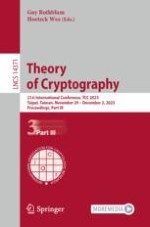2023 | OriginalPaper | Buchkapitel
Non-Interactive Anonymous Router with Quasi-Linear Router Computation
verfasst von : Rex Fernando, Elaine Shi, Pratik Soni, Nikhil Vanjani, Brent Waters
Erschienen in: Theory of Cryptography
Verlag: Springer Nature Switzerland
Aktivieren Sie unsere intelligente Suche, um passende Fachinhalte oder Patente zu finden.
Wählen Sie Textabschnitte aus um mit Künstlicher Intelligenz passenden Patente zu finden. powered by
Markieren Sie Textabschnitte, um KI-gestützt weitere passende Inhalte zu finden. powered by
